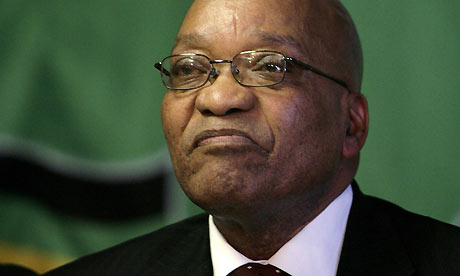South Africa’s prosecution says it will appeal against a court ruling that it should reconsider corruption charges against President Jacob Zuma. Originally, the charges were dropped weeks before the 2009 election which led to him becoming president.
But last month, a high court judge described that decision as “irrational”.
Mr Zuma has always denied the allegations which are linked to a 1999 arms deal worth billions of dollars.
After a case brought by the opposition, Judge Aubrey Ledwaba said in April that the National Prosecuting Authority (NPA) should consider re-opening the case. But National Director of Public Prosecutions Shaun Abrahams said that prosecutors should be able to exercise discretion over whether an investigation should continue.
Briefing journalists, Mr Abrahams said that this was an issue that affected the separation of powers and that the ruling “has far-reaching ramifications”.He said he would be seeking leave to appeal to the Supreme Court against the High Court ruling.
Quoting legislation that defines the role of the NPA, Mr Abrahams said that he did his job “without fear, favour or prejudice”, adding that no-one influenced his decisions.
- 1999: largest-ever post-apartheid arms deal announced with contracts totalling 30bn rand ($5bn; £2.5bn) to modernise national defence force
- Deal involved companies from Germany, Italy, Sweden, the UK, France and South Africa
- Allegations of bribery over deal dogged governments of President Jacob Zuma and predecessor Thabo Mbeki
- Mr Zuma’s former financial adviser Schabir Shaik convicted in 2005 for corruption over deal. Found guilty of trying to solicit bribe from Thint, local subsidiary of French arms firm Thales, on behalf of Mr Zuma – then deputy president. Released on parole on health grounds after serving just over two years
- Another official, Tony Yengeni, chairman of parliament’s defence committee at time of deal and ANC chief whip, convicted of fraud in 2003. Also freed on parole after serving five months of four-year sentence
- April 2016: commission of inquiry into deal found no further evidence of corruption or fraud.
The opposition Democratic Alliance asked the courts to review the 2009 decision after it got access to the evidence in the so-called “spy tapes” that led the chief prosecutor Mokotedi Mpshe to drop the case.
In 2009, Mr Mpshe said that the tapes – recordings of phone conversations between officials discussing the timing of the case against Mr Zuma – suggested that there was political interference in the investigation.
Last month, Judge Ledwaba said Mr Mpshe had “found himself under pressure” when he decided to discontinue the prosecution and “consequently made an irrational decision”.
“Considering the situation in which he found himself, Mr Mpshe ignored the importance of the oath of office which commanded him to act independently and without fear and favour.
“Mr Zuma should face the charges as outlined in the indictment,” the judge said.
The investigation into Mr Zuma’s alleged corruption had become heavily politicised, amid a power struggle between Mr Zuma and then-President Thabo Mbeki.
Mr Zuma was sacked as deputy president in 2005 shortly after his financial adviser, Schabir Shaik, was found guilty of corruption and fraud in relation to the arms deal.

